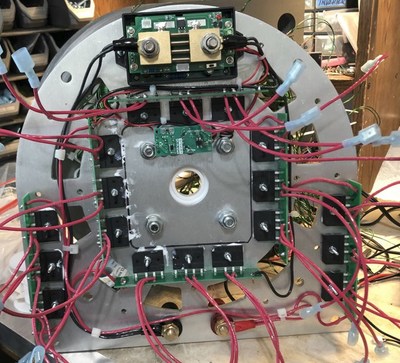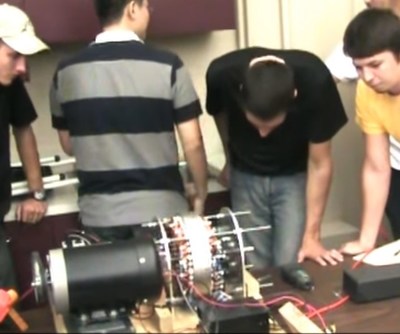DELTONA, Fla., April 12, 2022 /PRNewswire/ — In a Florida suburb, there is a small, innovative company that produced a generator that just might make that impact – The Franklin-Thomas Company (FTC [FTCInnovations.com]). This company has developed an independently proven, highly efficient electrical generator. This zero-cogging generator has the potential to impact social and economic challenges. It may even affect the immigration crisis at the U.S. Southern border.
While that concept may sound strange, consider one of Franklin-Thomas’s licensees, Dorn Ebanks, the former mayor of Roatan, Honduras. He plans to manufacture these generators in Honduras. In high level consultations with Congressman Rasel Antonio Tome, 3rd Vice-President of Congress of Honduras, C.A., Dorn Ebanks envisions immediate economic impacts on the country by providing Hondurans with needed jobs and better lives.
The generator would also mean consistent electrical power for everyone both in Honduras and beyond. But there is also a social impact that cannot be overlooked: providing local economic opportunities may significantly reduce massive immigration movements taking place by people seeking better lives elsewhere.
Dorn Ebanks has good reason to believe in what he is proposing. In the U. S., several customers of FTC reported high efficiency using this generator. One user of the generator near Tampa, Bob F., reports that the generator has performed so efficiently that he is now applying for a third patent precisely because of the FTC generator. Another FTC licensee, Infinity Industrial Controls from Clearwater, FL, has offered to supply Dorn with generators to quickly help.
The man who invented this generator is Joe Shepard, President of The Franklin-Thomas Company. In the beginning, Shepard never set out to invent a new generator. He was trying to develop vertical axis wind turbines but could not find a commercially available generator that would produce enough power. So, he was forced to try to develop his own generator.
After multiple designs and multiple failures, Shepard hit on his current zero-cogging design. Shepard said the design just came to him. Over the years several people have asked Shepard how he came up with such a unique design. He has only one answer – "I don’t know. It just was there."
Once Shepard was convinced his new design was uniquely efficient, he wanted to independently prove what he saw. At first he showed it to friends and they confirmed his conclusion. Next, he took the generator to Embry-Riddle University in Daytona Beach, Florida. There Dr. Liu had his whole electrical engineering class test it. Again, the extremely high efficiency was proven in front of and by the whole class.
Finally, Shepard took the big step and drove all the way to Raleigh, North Carolina and presented the generator to a U.S. Dept. of Energy Certified Testing Group, Advanced Energy for testing. Test came back at 92.3% mechanical energy in and electrical energy out. Shepard popped the champagne corks. He had done it and proved it.
There is one other thing about Shepard, he is never satisfied. As good as the generator was, it was not as good as he could make it. To that end, Shepard kept testing and refining his design. Last year, Shepard had another breakthrough.
Using an Arduino microcomputer, Shepard found that changing the circuitry in the generator could result in a huge boost in power and efficiency. To make it work, he ordered PC boards and got some new rectifiers. Everything came together as a powerful new FTC generator.
This new FTC generator is the one Dorn Ebanks and people like Bob from Tampa see as changing the world. It could help people want to stay in their own country.
Media Contacts
Joe Shepard
13867473999
333894@email4pr.com
Dorn Ebanks
333894@email4pr.com
Lynette Barry
333894@email4pr.com
SOURCE The Franklin-Thomas Company



